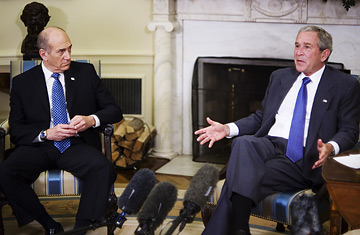
President Bush meets with Israeli Prime Minister Ehud Olmert in the Oval Office of the White House, June 19, 2007.
Tuesday's meeting between President Bush and Israeli Premier Ehud Olmert capped a week of perverse optimism among the Administration's Middle East policy experts. Somehow, the Bush team has managed to cast the takeover of Gaza by Hamas as a diplomatic opportunity for the U.S., Israelis and Palestinians. On Monday, Secretary of State Condoleezza Rice announced a resumption of aid to the emergency government of Palestinian President Mahmoud Abbas — whose supporters Hamas ousted in Gaza — and said, "We must take hold of this moment to make new progress." Bush echoed the sentiment in his meeting with Olmert Tuesday, saying, "And our hope is that President Abbas and that Prime Minister Fayyad, who is a good fellow, will be strengthened to the point where they can lead the Palestinians in a different direction, with a different hope."
Finding real grounds for hope in the latest developments in Palestine is not easy. True, when you've got 18 months left in office and the Middle East is in the throes of the worst crisis in decades thanks in part to your policies, any change in the status quo may be a cause for optimism. But there is more than Bush's wishful legacy hunting going on here. The President honestly believes he is getting a second chance to build up Abbas, aware as he is that America failed to do so after the two men met in Aqaba in 2003. But his latest move is more like a desperate accommodation to reality than a shining opportunity, and Bush risks causing even more damage if he is not careful in how he supports the beleaguered Palestinian President.
The catchphrase for the Administration's attempt to exploit the new Hamas-Abbas divide is "West Bank first." The idea is to provide economic and diplomatic support to the emergency government Abbas has installed in the West Bank, while isolating Hamas in Gaza. It is an inverse version of the "Gaza first" approach previously advocated by moderate Israelis and, briefly, by Secretary of State Colin Powell during his ill-fated shuttle diplomacy to the region during Bush's first term. If the West showers Abbas with money and promises of diplomatic progress toward a Palestinian state, the theory goes, he will be willing to make diplomatic accommodation with Israel and the West, and Palestinians generally will swing away from support for Hamas, which denies Israel's right to exist.
The problem is that Abbas and the Palestinian Authority are in no shape to deliver the stability Israel needs in return for those concessions. "The Palestinian Authority is largely dysfunctional," says Jim Prince, President of the Democracy Council, a nonprofit development contractor for the U.S. government in the Palestinian territories who has worked as an adviser to the Palestinian Ministry of Finance. "If we've learned anything it's that pouring dollars into a chaotic situation does not necessarily help. The system has to be fixed. Putting good money into a bad system increases the chaos and dysfunction."
Abbas may honestly want peace with Israel, but he doesn't control even the ministries in the Palestinian Authority, let alone the Fatah movement as a whole. Those ministries, where much of the U.S. aid will end up, remain corrupt, self-serving fiefdoms disinclined to pass benefits onto the Palestinian people. "The Palestinian Authority, including the West Bank ministries and Fatah are more corrupt and more fractured now than when Arafat ruled," says Prince. In essence, the U.S. risks funding the very groups that have driven frustrated Palestinians into the arms of Hamas to begin with.
Abbas has appointed a respected reformer, Salam Fayyad, as Prime Minister, and that is a positive development. But many remain skeptical that he and Abbas can deliver either benefits for the Palestinians or stability for the Israelis. Foremost among the skeptics: the Israelis themselves. They fear Hamas's grip on power in Gaza and would like to do what they can to boost its opponents. But they don't believe Abbas can necessarily deliver, and are in no hurry to put Israeli lives on the line in an effort to find out. "This is a moment of peril and of opportunity," says David Siegel, spokesman for the Israeli embassy in Washington, "It could be an important development but that can only be judged over time."
Which is precisely what Bush is starting to run out of.
